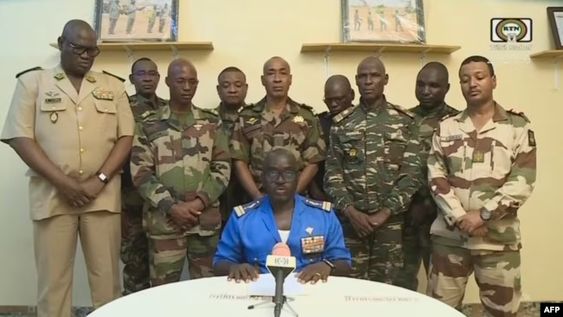Africa
Niger Soldiers Want to Overthrow President Bazoum

The United Nations and the United States have demanded for the release of Niger’s president, Mohamed Bazoum, after a group of soldiers claimed to have deposed him.
US Secretary of State Antony Blinken told reporters in New Zealand on Thursday that he had spoken with Bazoum and “made clear that the United States resolutely supports him as the democratically elected president of Niger.”
“Whether this is technically a coup or not, I can’t say; that’s for the lawyers to decide,” Blinken added. “What it clearly is is an attempt to seize power by force and disrupt the constitution.”
The United Nations, according to Stephane Dujarric, spokesman for UN Secretary-General Antonio Guterres, “stands in solidarity with the democratically elected government and people of Niger.”
Dujarric stated that Guterres is “deeply concerned” about Bazoum’s arrest and has advocated for his release without restrictions.
The soldiers announced their victory over Bazoum on national television on Wednesday.
“We, the defence and security forces… decided to put an end to the regime,” Colonel Amadou Abdramane, depicted seated and accompanied by nine other officers wearing fatigues, said from a statement. His message also cited “the deteriorating security situation and bad governance.”
According to Abdramane, all republican institutions have been suspended, the country’s borders have been closed, and a nationwide curfew has been enforced.
According to Reuters, the soldiers warned against foreign action and stated that they would protect Bazoum’s safety. The Associated Press noted that it was unknown where Bazoum was at the time of the announcement or if he had resigned.
Hours earlier, soldiers of Niger’s presidential guard encircled the presidential palace in what African organisations described as an attempted coup against Bazoum, the country’s democratically elected leader.
The Economic Community of West African States, or ECOWAS, also criticised the actions in Niger and urged coup plotters to release the president “immediately and without any condition.”
The ECOWAS statement committed to hold individuals involved in the scheme accountable for the protection of the president, his family, government officials, and the general public.
Others who condemned the alleged coup attempt included African Union Commission Chairman Faki Mahamat and former colonial power France, which has approximately 1,500 soldiers in Niger assisting the government in its fight against Islamist extremists.
Local journalist Ousseini Issa told VOA’s French to Africa programme that the situation in Niamey is “confusing.”
“At first, the presidency was out of reach, including for agents who work there,” Issa added. “Then we heard that soldiers from Ouallam, about 100 kilometres from Niamey, had arrived.” “The entire presidential area has been cordoned off, and all services have been suspended.”
According to Niger’s presidential administration, elements of the presidential guard initiated an anti-republican campaign on Wednesday morning and “tried in vain to obtain the support of the National Armed Forces and the National Guard.”
The fundamental question, according to Niger’s presidential special security adviser Abdoul Aziz Garba Birimaka, is what led to the failed coup.
“Indeed, that is the question: what brought us to this extreme? What exactly is going on? Why? … “How could all of this have happened without any suspicions as we learn that someone who is supposed to protect you is now holding you [against your will]?” Birimaka asked. “There are many questions that remain unanswered for the time being.”
The West African country is one of the most turbulent in the area, having experienced four military coups and a number of failed coup attempts since achieving independence from France in 1960.
Elements of the military attempted a failed coup two days before Bazoum’s inauguration in April 2021.
According to Michael Shurkin, a senior fellow at the Atlantic Council, “President Bazoum has been one of the most effective leaders in the area, if not the most effective leader.” He’s someone who, by many accounts, is doing everything right in terms of attempting to address the country’s massive challenges and effectively collaborating with Niger’s many Western security partners, including France and the United States.”
“A coup removes from the region a democratically elected and effective civilian official, replacing it with, first and foremost, a necessary period of uncertainty as Nigeriens must figure out what to do and take all the next steps,” he said. It’s also a major blow to the West, which has been looking to [Niger] as its final hope to affect events in the Sahel, while the Sahel has otherwise been swirling down the drain.”
Carol Van Dam Falk of the VOA English to Africa service and Idrissa Fall and Abdourahmane Dia of the VOA French to Africa service contributed to this report. Some of the information comes from Agence France-Presse and Reuters.
